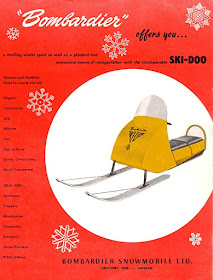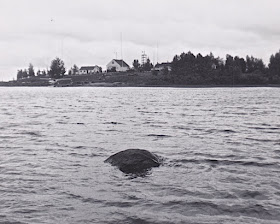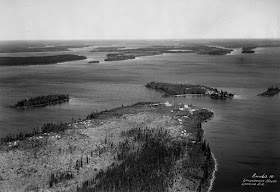Sometimes my narrative gets ahead of my father’s letters,
and sometimes my father goes back to a previous event.
A little of both occurs
as I share the rest of his letter dated
Thursday, May 25, 1961
when my father wrote:
Hi Folks:
Lansdowne House, Northern Ontario, Canada
© M. Louise (MacBeath) Barbour/Fundy Blue
© M. Louise (MacBeath) Barbour/Fundy Blue
All Rights Reserved
On Victoria Day, which was a holiday,
I rented a canoe and took the family on a picnic.
All of us, including Roberta and Gretchen, piled into a big freighter canoe,
and Sara and I paddled up the shore to Joe Alex’s place,
which is about a couple of miles up the peninsula.
Lansdowne House Today
Our parents paddled our canoe up to about the narrowest part of the south side of the peninsula.
Imagery: DigitalGlobe, Landstat/Copernicus
Map Data: Google 2017
Then we went ashore and ate.
Sara had some canned stew,
which I was never very fond of at home,
but which tasted delicious when it was heated up and eaten outside.
She also brought along lots of bread and butter,
coffee, and orange juice for the children.
Also, she baked a lovely cake for the picnic.
The picnic was actually on the Sunday before Victoria Day,
which was Monday, 22 May 61.
After the meal, Gretchen went swimming,
and Barbie and Donnie sneaked in wading.
I don’t know why all three of them didn’t die of pneumonia,
for they were right in among the ice cakes along the store.
I put a stop to the whole thing when I discovered it.
Donnie, holding Bertie, with Barbie
Smith's Cove, Nova Scotia, Canada
Summer 1960
© M. Louise (MacBeath) Barbour/Fundy Blue
All Rights Reserved
Roy with Gretchen
Margaretsville, Nova Scotia, Canada
Christmas 1958
© M. Louise (MacBeath) Barbour/Fundy Blue
All Rights Reserved
Roy and Louise took the canoe and went out a short distance
on the lake and practiced paddling the canoe.
It was most amusing to watch them.
Paddling a canoe requires co-operation,
and those two don’t know what the word means.
All they could do is compete.
As a result, they got nowhere for a while,
except around in circles.
They would get the canoe all lined up where they were trying to go,
and they would start out with a flourish.
Very shortly they would find the canoe swinging off course.
All that would be required at this stage would be for one of them
to shift sides and paddle on the opposite side;
but of course, each one would roar at the other one to shift,
and at the same time be too stubborn to shift themselves.
The Uncooperative
School Photos, Fall 1960
Smith's Cove, Nova Scotia, Canada
© M. Louise (MacBeath) Barbour/Fundy Blue
All Rights Reserved
Very shortly, the canoe would swing through a complete circle,
and they would be heading back where they came from.
It was an education in itself to listen to the recriminations
that were flying back and forth between them when this happened.
After about an hour of this futile floundering,
they finally caught on to the fact, that as much as they disliked it,
they had to co-operate and one had to be the boss
and tell the other one when to shift.
At this stage I interfered to tell them that the natural one
to command the canoe was the one in the stern,
because the canoe is controlled from the stern.
This immediately started another row,
because Roy was in the stern,
and Louise wanted to be in command.
She had jumped into the front at the start
because she thought that the front position was the most important.
The only reason Roy didn’t fight for the front position
was that I had had him out with me before the picnic,
and I had taken the stern.
I told him then that the most experienced paddler always takes the stern,
and so Roy was quite willing to take the stern.
I finally had to take a hand and tell them
that Roy could command the ship for a while,
and then, when I told them, they were to come ashore and shift positions.
Once they learned about co-operation and settled their jurisdictional dispute,
they got along great and could go anywhere they wanted to.
This canoe episode was a better lesson in co-operation
than all the lecturing that I could do in a year.
Somewhat Working Together
Roy and I (Louise)
Attawapiskat Lake, Northern Ontario, Canada
Victoria Day, 1961
© M. Louise (MacBeath) Barbour/Fundy Blue
All Rights Reserved
Right about now I can just see Nana, Grammie, Great Grammie,
and Aunt Maude all sitting down to write me letters
scolding me for allowing the two of them out alone in a canoe.
I can assure you that the canoe I had on the picnic
was quite different from the one I had last fall.
It was a small two-man canoe and was as skittish as a strange cat,
and it would upset if you looked at it incorrectly.
The one I had on the picnic was a big eighteen-foot
freighter canoe with a four-foot beam.
It was as steady, as safe, and as hard to upset as a Newfoundland dory.
They are one of the safest crafts afloat.
Don’t worry.
I wouldn’t have allowed them out in it alone
if it was the least bit dangerous.
Survivors of Childhood
Roy and I (Louise)
Beautiful Cove, Long Island, Nova Scotia, Canada
August 2, 2016
© M. Louise (MacBeath) Barbour/Fundy Blue
All Rights Reserved
I don’t think I ever mentioned Joe Alex’s place in any descriptions of Lansdowne House.
Joe Alex was a Jewish free trader who had a store
about two miles up the peninsula from the Hudson’s Bay store.
He was running in competition with the Bay.
He had his own private plane.
About three years ago he crashed the plane and killed himself,
and since then the place has been deserted.
It is slowly falling into ruin.
After about two hours at Joe Alex’s,
I loaded the family in the canoe, minus our baggage
and headed further up the lake.
About a mile further on, the lake was completely free of ice.
I have since learned that for the last week of break-up the lake
was free of ice except for three or four miles square around the settlement.
This area was still frozen over for some reason.
We spent a delightful time paddling around the water, and then we started home.
On our way we stopped at Joe Alex’s to pick up our baggage,
including some of Roberta’s diapers which we had left drying on a bush.
For a photograph of Ojibwa "Diapers" from that time period click here.
Ice Free Northern Lake
Somewhere Close to Lansdowne House
Photo by Don MacBeath, September 1960
© M. Louise (MacBeath) Barbour/Fundy Blue
All Rights Reserved
We arrived home about six in the evening,
happy, but tired and sunburned after a day in the open.
It is hard to believe that we went on this picnic,
and if it wasn’t for my red face,
I would almost think I had dreamed it,
for yesterday and today have been miserable.
We actually had quite a bit of snow the last two days.
I don’t think I’ll ever cease to be amazed
at how essentially polite and courteous the Indians are.
True, they never say please or thank you,
and they make the women do the hard work,
and the men get the preferred treatment,
but this is a result of their culture and customs
and not because of any inborn impoliteness.
In the old days the men were the hunters and provided the food,
and the women ran the homes, cut the wood,
hauled the water, and did all the dirty work.
They had to, because the men were away hunting so much.
In fact, the women’s lot was so hard,
that it was not uncommon for the Indian mothers to kill their female babies
rather than to let them live to spend as hard a life as they had.
Times are changing though,
and now you see quite a few of the younger men
hauling water and cutting wood and even carrying the tikinagans,
something you never would have seen fifty years ago
or even twenty-five years ago.
Indian Mother with Baby in a Tikanagan
Lansdowne House, Northern Ontario, Canada
Photo by Don MacBeath, Fall 1960
© M. Louise (MacBeath) Barbour/Fundy Blue
All Rights Reserved
But I started to tell you about the politeness of the Indians.
There were a lot of canoes out that Sunday,
and most of them had outboard motors.
Whenever one of the canoes came near our canoe,
they would throttle back the motor and go past us as slowly as possible
so as not to swamp us with the wake from the motor.
A couple of them even shut off their motors and paddled past us.
I can imagine what would have happened
if the canoes had been operated by white people, especially teenagers.
The Indian teenagers were just as polite as their elders.
And I wonder where, outside, if anywhere, that you could leave
all your equipment, including a camp stove and dishes and jackets
on a beach for a couple of hours and come back and find nothing disturbed.
We didn’t even bother to lock the house,
although we were away for most of the day.
Well, I have an awful lot more to tell you about the break-up
and meeting the first plane (I was in one of the canoes),
but I have to sign off now and get some official mail ready for tomorrow,
so I’ll have to continue this narrative tomorrow and send it out next week.
All the members of the family are well and thriving on this northern life.
Roberta has gained a lot of weight, and Sara looks wonderful.
I am holding down my weight.
Roy has been bothered some with his tonsils
and will have to have them out as soon as we go outside,
but he is ok just now.
Tomorrow is his birthday, and he is quite excited about it.
Well, this is an example of damned poor planning,
having to start a fourth page like this.
I really had intended to finish it in three pages,
but the end sort of snook up on me.
If I had the time, it would be the logical thing to do to finish this new page,
but I just haven’t got the time, so I’ll have to sign off now,
new page or no new page. Bye for now.
See you all next week.
Love, Don.
Returning from Joe Alex's
Lansdowne House, Northern Ontario, Canada
Photo by Don MacBeath, Victoria Day, 196
© M. Louise (MacBeath) Barbour/Fundy Blue
All Rights Reserved
My Father continued in a handwritten postscript to his mother:
Oh well, Mother, it gives me some space to write a private note to you.
Roy’s parcel arrived safely and on time.
He doesn’t know about it though.
He hasn’t opened it yet, but it wasn’t damaged or anything.
Will write next week and tell you all about the birthday.
Thanks for Roy’s parcel.
It’s good to see that Aunt Maude is up and around again
and is more like her old self again.
I am glad that you are finally rid of the property,
although I feel queer in a way to think that we no longer own the corner,
but it was the only thing to do, because I’ll never be living in Charlottetown again -
at least not till I am retired,
and especially if I get this new job in Sioux Lookout.
My Grandmother MacBeath's Apartment Building and Home
at the Corner of Fitzroy and Edward
at the Corner of Fitzroy and Edward
(We lived in the two-story apartment with the red and white door in the mid-1950s.)
Charlottetown, Prince Edward Island, Canada
Oh yes, they are going to meet me in North Bay for the interview
some time in July - date to be announced later,
and I imagine it will be in the first week in July.
I think I am almost certain of getting the job.
I hope so, because it would be a wonderful promotion.
Sunday school is proceeding well.
Thanks for the carbon paper. It is just what I wanted.
Well, I got to sign off now.
I hope this letter lives up to my promise of a nice long letter.
Next week’s will be just as long,
for I have more to tell about break-up.
Bye for now,
Love, Don
Till next time ~
Fundy Blue
Waiting for the Ferry to Tiverton
Eastern Passage, Digby Neck, Bay of Fundy
© M. Louise (MacBeath) Barbour/Fundy Blue
All Rights Reserved
Notes:
1. Victoria Day:
Victoria Day is a federal public holiday celebrated in Canada on the last Monday before May 25,
in honour of Queen Victoria's birthday. It is the Monday between the 18th to the 24th, and thus it
is always the penultimate Monday of May. The current Canadian sovereign's birthday, Queen
Elizabeth II's, is officially recognized on Victoria Day. Many Canadians consider it the informal
start of summer. Wikipedia
by Alexander Melville, 1845
3. Sunday School: My father was conducting regular Sunday School lessons with us, because
only itinerant Anglican ministers visited Lansdowne House. Reverend Harold
Mitton of the First Baptist Church in Charlottetown, Prince Edward Island regularly sent my
father materials.
It's funny to see four digit telephone numbers nowadays and to realize that you could mail a letter
in Charlottetown to be delivered in Charlottetown and just write "City" in the address.
Mother's Day Church Bulletin
May 14, 1961
© M. Louise (MacBeath) Barbour/Fundy Blue
All Rights Reserved
Mail for My Father
from Reverend Mitton
May 15, 1961
© M. Louise (MacBeath) Barbour/Fundy Blue
All Rights Reserved
Map of Canada
Highlighting Ontario
Lansdowne House, Ontario
Attawapiskat Lake and Lansdowne House
Map Data Google 2018
Attawapiskat Lake
An Unusual Depiction of Life There
Original Source Unknown
Found At: hypenotic








































